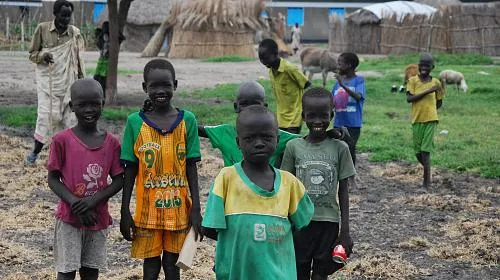JANUARY 9 UPDATE
The United Nations estimates up to 200,000 people have been displaced by the hostilities that erupted on December 15. This number includes 62,000 people who have taken shelter in United Nations peacekeeping bases and tens of thousands who have fled to neighboring countries. The number of displaced is probably much higher than current estimates because aid agencies are unable to travel outside of major population centers to assess the situation. The United Nations notes that thousands more may still be hiding in the bush, out of the current reach and sight of humanitarian workers. Everyone who has been displaced – including a large number of women and children – are in dire need of humanitarian assistance.
Many of the several dozen health clinics CARE supports are open and providing lifesaving services, including those in Jonglei and Unity states, where much of the recent fighting has occurred. Staff have reported a drop in the number of women accessing reproductive health services as a result of the violence. According to the staff, women are afraid to go out; only those that are facing severe complications will brave the dangers to get to the health facilities.
In times of conflict, women and girls are particularly at risk. For example, when health clinics are too dangerous to access, pregnant women may face dangerous deliveries; when on the move or staying in unprotected settlements, women and girls are at risk for harassment or rape. Learn more >
CARE is doing everything we can to not only respond to the current crisis, but also to adapt our on-going programs to the current situation. Real and sustainable development is crucial to South Sudan’s future stability and CARE is committed to long-term programming that supports development. All of our programming also seeks to empower one of the country’s most underutilized resources, its women.
DECEMBER 22 UPDATE
CARE is deeply concerned about the violence in South Sudan, and calls all those involved to end the fighting and ensure the protection of civilians. In times of conflict, women and girls are particularly at risk. It is crucial that acts of sexual and gender-based violence are prevented.
CARE has been operating at limited capacity over the past few days.
CARE currently runs programs in Jonglei, Upper Nile and Unity States. The programs focus on health, water, sanitation, livelihoods and peacebuilding for hundreds of thousands of people. We continue monitoring the situation closely while providing basic livesaving services.
The recent violence underlines the fragile situation in the world’s youngest nation, still recovering from almost 50 years of civil war.
CARE’S WORK IN SOUTH SUDAN: We have been operating in Southern Sudan since 1993, initially providing humanitarian relief to internally displaced people in Western Equatoria. The signing of the Comprehensive Peace Agreement in 2005 allowed CARE to expand into Jonglei, Unity and Upper Nile to target the returnees from the refugee camps and the communities that host them. Learn more >

